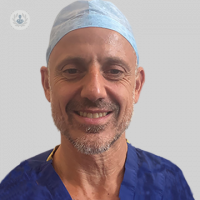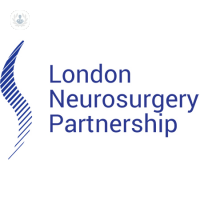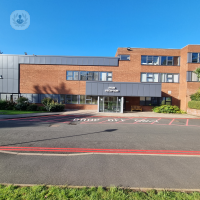What is a meningioma?
A meningioma is a type of tumour that is typically benign (non-cancerous). They arise from membranes covering and indenting the brain (and rarely the spinal cord).
Most meningiomas are solitary and sporadic, that arise for no clear reason. Rarely meningiomas can develop as part of other tumour syndromes such as NF2. A known cause can be radiation treatment in childhood. Meningiomas tend to occur more commonly in women (around 2/3) than men (1/3).
Typically, they grow very slowly, but with growth may cause focal neurological symptoms.
There are generally 3 different grades of meningioma:
Grade I – tumour grows very slowly (majority of meningiomas are grade 1)
Grade II – tumour grows more quickly and is often called atypical meningioma
Grade III – tumour grows and spreads very quickly and is often called anaplastic or malignant meningioma (very rare and only account for 1-4% of all meningiomas).

What are the symptoms?
With increased scanning, meningiomas are often found by chance before causing any symptoms. With growth they can cause headaches from raised pressure in the head. If the meningioma affects the underlying brain, symptoms will relate to the area of the brain that is affected by the tumour and what that area controls.
Symptoms of a meningioma may include:
- Headaches
- Seizures
- Drowsiness
- Changes in personality or behaviour
- Weakness, especially in arms and legs
- Problems with speech, vision or hearing
- Memory loss
How is a meningioma diagnosed?
In a lot of cases, meningiomas are asymptomatic. They can often be found incidentally during investigations for other conditions.
If there is suspicion of a meningioma, your doctor will conduct a full neurological evaluation followed by an imaging test, like an MRI or a CT scan, to get an image of your brain and locate the tumour.
The only definitive way of confirming a meningioma and its grade is by a biopsy (examination of a tumour sample). The tissue obtained will outline the appropriate treatment plan or whether to ‘watch and wait’ to observe any changes.
How is a meningioma treated?
Treatment depends on the location, grade, characteristics, and behaviour of the meningioma. Small, asymptomatic meningiomas may not require immediate treatment. Their development can be carefully monitored with regular scans to detect growth or changes - in which case intervention may be required.
For some meningiomas, the main treatment is surgery. During this intervention, a surgeon will perform a craniotomy (the temporary removal of the bone flap) to extract the tumour.
However, complete removal may not be possible for everyone - for example, if the tumour has invaded surrounding veins. In these cases, the surgeon will extract as much of the meningioma as possible to improve neurological functions.
Your doctor will then recommend alternative treatment, such as Radiotherapy or Stereotactic Radiosurgery, or you may have radiation treatment as the main treatment.
What is the prognosis?
Tumour location, its size and grade as well as patient factors (such as age) can determine the success rate of treatment. Careful follow up will monitor the treatment success and any further interventions or treatment that may be required.
Which specialist treats meningiomas?
You will be referred to a neurosurgeon who will confirm your diagnosis and recommend the best treatment for you.
03-09-2022 01-05-2024Meningioma
What is a meningioma?
A meningioma is a type of tumour that is typically benign (non-cancerous). They arise from membranes covering and indenting the brain (and rarely the spinal cord).
Most meningiomas are solitary and sporadic, that arise for no clear reason. Rarely meningiomas can develop as part of other tumour syndromes such as NF2. A known cause can be radiation treatment in childhood. Meningiomas tend to occur more commonly in women (around 2/3) than men (1/3).
Typically, they grow very slowly, but with growth may cause focal neurological symptoms.
There are generally 3 different grades of meningioma:
Grade I – tumour grows very slowly (majority of meningiomas are grade 1)
Grade II – tumour grows more quickly and is often called atypical meningioma
Grade III – tumour grows and spreads very quickly and is often called anaplastic or malignant meningioma (very rare and only account for 1-4% of all meningiomas).

What are the symptoms?
With increased scanning, meningiomas are often found by chance before causing any symptoms. With growth they can cause headaches from raised pressure in the head. If the meningioma affects the underlying brain, symptoms will relate to the area of the brain that is affected by the tumour and what that area controls.
Symptoms of a meningioma may include:
- Headaches
- Seizures
- Drowsiness
- Changes in personality or behaviour
- Weakness, especially in arms and legs
- Problems with speech, vision or hearing
- Memory loss
How is a meningioma diagnosed?
In a lot of cases, meningiomas are asymptomatic. They can often be found incidentally during investigations for other conditions.
If there is suspicion of a meningioma, your doctor will conduct a full neurological evaluation followed by an imaging test, like an MRI or a CT scan, to get an image of your brain and locate the tumour.
The only definitive way of confirming a meningioma and its grade is by a biopsy (examination of a tumour sample). The tissue obtained will outline the appropriate treatment plan or whether to ‘watch and wait’ to observe any changes.
How is a meningioma treated?
Treatment depends on the location, grade, characteristics, and behaviour of the meningioma. Small, asymptomatic meningiomas may not require immediate treatment. Their development can be carefully monitored with regular scans to detect growth or changes - in which case intervention may be required.
For some meningiomas, the main treatment is surgery. During this intervention, a surgeon will perform a craniotomy (the temporary removal of the bone flap) to extract the tumour.
However, complete removal may not be possible for everyone - for example, if the tumour has invaded surrounding veins. In these cases, the surgeon will extract as much of the meningioma as possible to improve neurological functions.
Your doctor will then recommend alternative treatment, such as Radiotherapy or Stereotactic Radiosurgery, or you may have radiation treatment as the main treatment.
What is the prognosis?
Tumour location, its size and grade as well as patient factors (such as age) can determine the success rate of treatment. Careful follow up will monitor the treatment success and any further interventions or treatment that may be required.
Which specialist treats meningiomas?
You will be referred to a neurosurgeon who will confirm your diagnosis and recommend the best treatment for you.
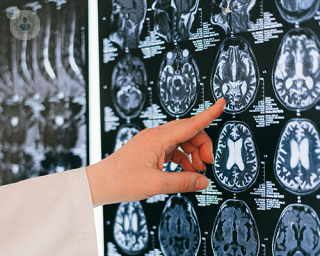

Understanding brain tumour types: Symptoms, diagnosis, and treatment options
By Mr Anastasios Giamouriadis
2024-12-30
A brain tumour is an abnormal growth of cells within or around the brain, which may be benign (non-cancerous) or malignant (cancerous). Here, Mr Anastasios Giamouriadis, renowned consultant neurosurgeon and brain and spinal surgeon, provides expert insights into the various types of brain tumours, examining their symptoms, diagnostic techniques, and treatment options. See more


Understanding meningioma: Insights and options
By Mr Pedro Oliveira Castanho
2024-12-27
In his latest online article, Mr Pedro Oliveira Castanho gives us his insights into meningioma. He talks about what meningioma is, the causes, how it's detected, if it should be removed, treatment options, the benefits and side effects and the outlook See more
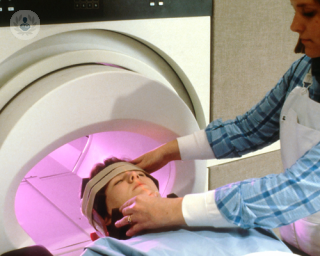

Meningioma: What's the treatment process?
By Mr Andrew Kay
2024-12-22
The treatment process for meningioma, a type of tumour that arises from the meninges (the protective membranes covering the brain and spinal cord), depends on several factors such as the size, location, growth rate, and symptoms caused by the tumour. Meningiomas are usually benign (non-cancerous), but they can sometimes be malignant or cause significant symptoms due to their location. In this article, leading consultant neurosurgeon Mr Andrew Kay provides a detailed overview of the treatment process. See more
Experts in Meningioma
-
Mr Sinan Barazi
NeurosurgeryExpert in:
- Meningioma
- Trigeminal neuralgia
- Acoustic neuroma
- Pituitary tumours
- Endoscopic skull base surgery
- Facial pain
-
Mr Ranjeev Bhangoo
NeurosurgeryExpert in:
- Laser Interstitial Thermal Therapy (LITT)
- Meningioma
- Gamma knife
- CyberKnife
- Brain metastasis
- Brain tumour
-
Ms Mary Murphy
NeurosurgeryExpert in:
- Arteriovenous malformation
- Cavernoma
- Gamma knife
- Meningioma
- Vascular malformations
- Brain metastasis
-
Mr Jonathan Hyam
NeurosurgeryExpert in:
- Gamma knife
- Brain tumour
- Acoustic neuroma
- Trigeminal neuralgia
- Meningioma
- Brain metastasis
-
Mr Patrick Grover
NeurosurgeryExpert in:
- Acoustic neuroma
- Arteriovenous malformation
- Brain tumour
- Cavernoma
- Gamma knife
- Meningioma
- See all

London Neurosurgery Partnership
London Neurosurgery Partnership
78 Harley Street W1G 7HJ
No existe teléfono en el centro.
By using the telephone number provided by TOP DOCTORS, you automatically agree to let us use your phone number for statistical and commercial purposes. For further information, read our Privacy Policy
Top Doctors

Cleveland Clinic London Hospital
Cleveland Clinic London Hospital
33 Grosvenor Place
No existe teléfono en el centro.
By using the telephone number provided by TOP DOCTORS, you automatically agree to let us use your phone number for statistical and commercial purposes. For further information, read our Privacy Policy
Top Doctors

The Priory Hospital - part of Circle Health Group
The Priory Hospital - part of Circle Health Group
Priory Road, Edgbaston, Birmingham B5 7UG
No existe teléfono en el centro.
By using the telephone number provided by TOP DOCTORS, you automatically agree to let us use your phone number for statistical and commercial purposes. For further information, read our Privacy Policy
Top Doctors
-
London Neurosurgery Partnership
78 Harley Street W1G 7HJ, Central LondonExpert in:
- Neurological spinal surgery
- Back pain
- Neurosurgery
- Paediatric neurosurgery
- Trauma
- Brain and spinal tumours
-
Cleveland Clinic London Hospital
33 Grosvenor Place, Central LondonExpert in:
- Cardiology
- Colorectal surgery
- Minimal access surgery (keyhole surgery)
- Gallbladder surgery
- Diagnostic Imaging
- Ultrasound
-
The Priory Hospital - part of Circle Health Group
Priory Road, Edgbaston, Birmingham B5 7UG, EdgbastonExpert in:
- Cancer
- General Surgery
- Orthopaedic surgery
- Thoracic Surgery
- Obstetrics and Gynaecology
- Urology
- Most viewed diseases, medical tests, and treatments
- Alzheimer's disease
- Cluster headaches
- Tension headache
- Chronic headache
- Peripheral nerve block
- Lumbar herniated disc
- Spinal surgery
- Minimal access surgery (keyhole surgery)
- Parkinson's disease
- Ulnar nerve surgery

